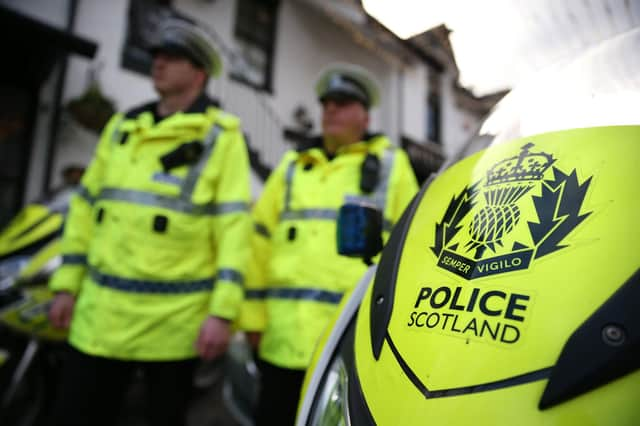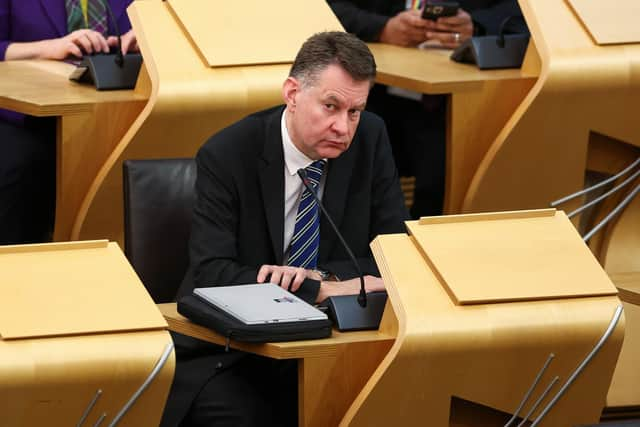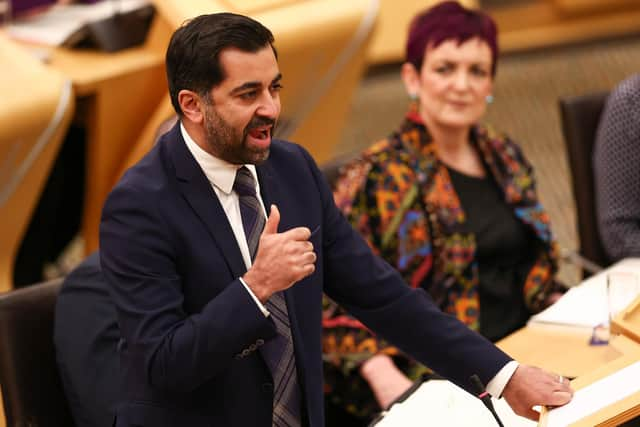Police handling of non-crime hate incidents branded 'total shambles' amid confusion


Police Scotland’s controversial policy on handling non-crime hate incidents has been branded a “total shambles” by the MSP who has been on the receiving end of a complaint – as he claimed the force is “making things up as they go along”.
Conservative MSP Murdo Fraser has been embroiled at the centre of a row over the recording of such incidents after he was logged for a complaint over criticism he posted on social media about the Scottish Government’s transgender policies. Mr Fraser has threatened Police Scotland with legal action, claiming the force has acted “unlawfully” in recording the non-crime hate incident against his name.
Advertisement
Hide AdAdvertisement
Hide AdBut in a letter from deputy police constable of Police Scotland, Alan Speirs, sent to Holyrood’s Criminal Justice Committee, the force has played down how non-crime hate incidents are dealt with.


In his letter, Mr Speirs insists that “such incidents will be recorded only where it is necessary and proportionate to do so, and where keeping a record of the circumstances of the incident meets a particular policing purpose”.
But Police Scotland’s policy states that “for recording purposes, the perception of the victim or any other person is the defining factor in determining whether an incident is a hate incident or in recognising the malice element of a crime”.
It adds that “evidence of malice and ill-will is not required for a hate crime or hate incident to be recorded and thereafter investigated as a hate crime or hate incident by police”.
Mr Fraser labelled the situation a “total shambles”.


Speaking to The Scotsman, he added: “Police Scotland’s chopping and changing of their policy of recording non-crime hate incidents is piling confusion on top of uncertainty.
“Previously, they defended to the hilt their policy of recording them, but they now appear to be back-pedalling. I’d be intrigued to know whether they now consider it ‘necessary or appropriate’ to have recorded the complaint made against me.
“It appears that they are making things up as they go along, which is deeply concerning given that the new Hate Crime Act is coming into force on Monday. This sorry saga will inevitably leave the public with little to no confidence in police handling of complaints.”
It comes amid confusion over whether police are reviewing their policy amid a warning that officers could be flooded with “hundreds of malicious complaints”.
Advertisement
Hide AdAdvertisement
Hide AdHumza Yousaf Yousaf told MSPs that police are reviewing their policy of how non-crime hate incidents are recorded, but the force has stressed no active review is taking place.
At First Minister’s Questions, Mr Yousaf defended his government’s Hate Crime Act, insisting it is simply extending stirring up offences and “extending those protections to other marginalised groups”.
The new law, which will be enforced from Monday, will create new stirring up of hatred offences for protected characteristics including age, disability, religion, sexual orientation and transgender identity. These extra provisions will add to the long-standing stirring up racial hatred offences, which have been in place since 1986. Under the law, offences are considered "aggravated" if they are motivated by prejudice on the basis of set characteristics, which could influence sentencing by judges. Crucially, a criminal act must have occurred for the hate crimes aggravator to be applied.
Scottish Tory leader Douglas Ross warned that under the policy, “innocent people are put on the police record when they have done nothing wrong”.
In response, Mr Yousaf said the recording of non-crime hate incidents came “as a direct result of the Stephen Lawrence inquiry” and has been in place “for many years”.
He added: “Non-crime incidents are recorded for other incidents as well that don’t meet a criminal threshold, such as for domestic abuse incidents. The Hate Crime Act is not yet in force and there’s nothing within the Hate Crime Act that changes how hate crime or indeed a non-crime hate incident is recorded.”
Acknowledging the concerns around the recording of non-crime hate incidents, Mr Yousaf said that Police Scotland “ will be reviewing how non-crime hate incidents are recorded”, after “the changes that have been made in England and Wales” following a legal challenge.
But Mr Ross insisted that “the controversial new law is ripe for abuse”.
Advertisement
Hide AdAdvertisement
Hide AdHe added: “Humza Yousaf can see absolutely no flaw in his legislation he took through this parliament, despite the overwhelming evidence we’re getting from frontline officers and many others.
“It is so flawed that whatever its intentions, it is likely to create more division. Overworked, under-resourced police officers will be forced to deal with hundreds of malicious complaints. Humza Yousaf’s law could be weaponised against people with opposing views.
“Police investigations will tarnish the names of innocent people and could silence them. This law is overreach by the SNP.”
In response, the First Minister said he had “absolute faith in the police’s ability to weed out vexatious complaints”.
He added: “I have absolute faith in their ability to address those issues in ways that are appropriate.
“Stirring up offences are not new - they have existed since 1986, for most of my entire life. Therefore, I’ve got absolute confidence in Police Scotland’s ability to be able to police new stirring up offences in the ways that are appropriate.”
In England and Wales, police no longer record non-crime incidents that are malicious or vexatious following a legal challenge.
In his letter to MSPs, Mr Speirs has suggested that some parts of the guidance from the College of Policing could be embedded into Police Scotland’s guidelines.
Advertisement
Hide AdAdvertisement
Hide AdHe said: “The College of Policing recently published its guidance relating to the recording of non-crime hate incidents, to coincide with the introduction (in England and Wales) of a Home Office code of practice for the recording of such incidents.
“Whilst the code and associated guidance is not directly applicable in Scotland, it is currently being reviewed by Police Scotland ensuring that any elements of best practice are captured and embedded within our guidance.”
A Police Scotland spokesperson said: “The recording of non-crime hate incidents has been in place for many years as a result of recommendations in the McPherson report.
"Police Scotland has a duty to prevent as well as detect crime and also to work to improve community wellbeing. The recording of such matters is in line with that duty and with the McPherson report. Police Scotland is aware that the College of Policing has released guidance regarding NCHIs and we are considering its recommendations."